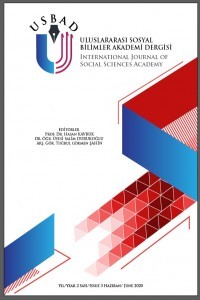Mark Hutchings, Türkler, Repertuvarlar ve Erken Modern Dönem İngiliz Sahnesi, London: Palgrave Macmillan, 2017, ISBN: 978-1-137-46262-6, pp.254
Mark Hutchings, Rönesansta Drama, Erken Modern Çağ İngiliz Sahnesi
Mark Hutchings, Turks, Repertories, and the Early Modern English Stage, London: Palgrave Macmillan, 2017, ISBN: 978-1-137-46262-6, pp.254
Mark Hutchings, Renaissance Drama, Early Modern English Stage,
___
- Barbour, R. (2003). Before Orientalism: London's Theatre of the East, 1576-1626. Cambridge: Cambridge University Press.
- Burton, J. (2005). Traffic and Turning: Islam and English Drama, 1579–1624. Newark: University of Delaware Press.
- Degenhart, J. H. (2010). Islamic Conversion and Christian Resistance on the Early Modern Stage. Edinburgh: Edinburgh University Press.
- Dimmock, M. (2005). New Turkes: Dramatizing Islam and the Ottomans in Early Modern England. Aldershot: Ashgate.
- Hutchings, M. (2017). Turks, Repertories, and the Early Modern English Stage. London: Palgrave Macmillan.
- Matar, N. (1999). Turks, Moors, and Englishmen in the Age of Discovery. New York: Columbia University Press.
- Mcjannet, L. (2006). The Sultan Speaks: Dialogue in English Plays and Histories About the Ottoman Turks. London: Palgrave Macmillan.
- Vitkus, D. (2003). Turning Turk: English Theater and the Multicultural Mediterranean. London: Palgrave Macmillan.
- Başlangıç: 2019
- Yayıncı: Salim DURUKOĞLU
Covid 19 Pandemisinin Psikolojik ve Ekonomik Etkileri
Reklam İçerik Boyutlarının Feminist Reklam Değerine Yönelik Kadınlar Üzerindeki Etkisi
Sosyal Medyada Hakikatin Önemsizleşmesi: Katarlılara Sınavsız Üniversite Örneğinde Twitter Analizi
Gökhan CANTÜRK, İbrahim YÜKSEL
Roman Tekniği Bakımından Hüseyin Nihal Atsız’ın “Ruh Adam” Romanı
Mustafa KARABULUT, Betül KOCAMAN AKPINAR
İlkokul Öğrencilerinin Bakış Açısından Özel Gereksinimli Akranlarının Okuldaki Deneyimleri
Sıla DOĞMAZ TUNALI, Hüseyin MUTLU, Filiz KARADAĞ, Vesile YILDIZ DEMİRTAŞ
Yazılı Tarihte Yönetim ve İktidar İlişkileri: Kadın Bunun Neresinde?
Birinci Dünya Savaşı Başlarında Erzurum’da Tifüs Salgını ve Hafız İsmail Hakkı Paşa’nın Vefatı
